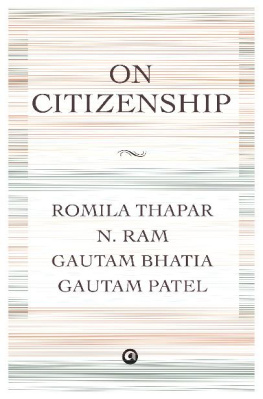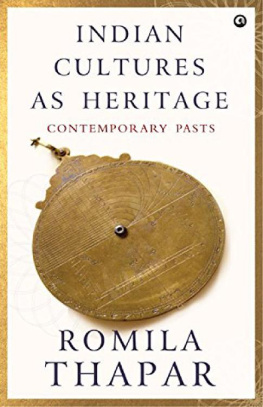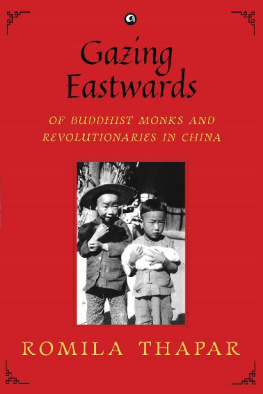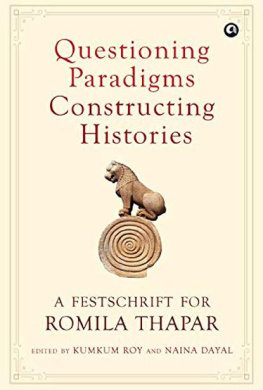In On Citizenship , four of Indias finest public intellectuals go deep into key aspects of what constitutes citizenship in India, an issue that has lately been the subject of furious public debate, as a result of controversial decisions by the government in power.
In the lead essay in this volume, The Right to be a Citizen, the historian Romila Thapar explores how citizenship evolved in India and the rest of the world. In addition, she examines the rights of citizens and analyses the states duties towards its citizens.
In his essay, The Evolving Politics of Citizenship in Republican India, the editor and political commentator N. Ram provides a cogent and succinct political history of citizenship in the sovereign, secular, democratic republic of India.
In Citizenship and the Constitution, the legal scholar and writer Gautam Bhatia explores constitutional provisions relating to citizenship. He shows how Part II of the Constitution articulates a vision of Indian citizenship that is interwoven with the Indian constitutional identity as a whole: secular, egalitarian, and non-discriminatory.
The essay by the jurist Gautam Patel, Past Imperfect, Future Tense, looks at, among other things, the organization of key provisions of the Constitution, and how they relate to citizenship, with an emphasis on the relationship between citizenship and fundamental rights.
Taken together, the essays in On Citizenship provide the reader with clear, informed, compelling insights into the vexed issue of citizenship in India today.

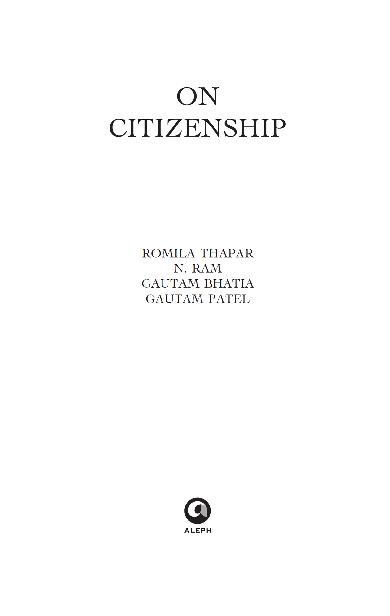
ALEPH BOOK COMPANY
An independent publishing firm
promoted by Rupa Publications India
First published in India in 2021
by Aleph Book Company
7/16 Ansari Road, Daryaganj
New Delhi 110 002
This edition copyright Aleph Book Company 2021
Copyright in individual essays vests in the respective authors.
All rights reserved.
The views and opinions expressed in this book are those of the authors and the facts are as reported by them, which have been verified to the extent possible, and the publisher is in no way liable for the same.
The publisher has used its best endeavours to ensure that URLs for external websites referred to in this book are correct and active at the time of going to press. However, the publisher has no responsibility for the websites and can make no guarantee that a site will remain live or that the content is or will remain appropriate.
No part of this publication may be reproduced, transmitted, or stored in a retrieval system, in any form or by any means, without permission in writing from Aleph Book Company.
ISBN: 978-81-949372-8-9
This book is sold subject to the condition that it shall not, by way of trade or otherwise, be lent, resold, hired out, or otherwise circulated without the publishers prior consent in any form of binding or cover other than that in which it is published.
CONTENTS
Citizenship: The Right to be a Citizen
ROMILA THAPAR
The Evolving Politics of Citizenship in Republican India
N. RAM
Citizenship and the Constitution
GAUTAM BHATIA
Past Imperfect, Future Tense
GAUTAM PATEL
A NOTE ABOUT THE BOOK
On Citizenship is the latest book in a series published by Aleph in which eminent writers and thinkers comment on some of the most pressing issues facing the country today. This volume goes deep into key aspects of what constitutes citizenship in India, an issue that has lately been the subject of furious debate and, worryingly, controversial decisions by the government in power.
Citizenship, as Romila Thapar points out in the lead essay in the volume, The Right to be a Citizen, may be defined as the relationship between the individual as a citizen with the state to which he or she may belong. This is the state to which citizens owe allegiance and for which they perform some agreed upon duties, and in return the state has to protect them in various ways. In India, according to the Citizenship Act, 1955, citizenship may be acquired in one of five waysbirth, descent, registration, naturalization, and the incorporation of territory. As soon as one becomes a citizen of India, one enjoys a panoply of rights guaranteed by the Constitution to every Indian. After much debate, the nations founders unambiguously rejected any suggestion of privileging one citizen of India over any other on grounds of race, religion, caste, or class when it came to granting citizenship. Today, some of these basic characteristics of citizenship, especially those having to do with secularism and civic nationalism, are under attack. The four contributors to this volume explain why it is important that these and other the fundamental attributes of citizenship envisioned by the countrys founders, and guaranteed by the Constitution be preserved at all costs.
In her essay, The Right to be a Citizen, the historian Romila Thapar explains how the concept of citizenship evolved over time, and shows how it was strengthened in modern times. She writes: The historical change of the lower orders of society, from slave to serf to subject and finally to citizen was recognized as a change from having virtually no rights to having rights as well as the right to assert these rights, as one political theorist expressed it. In the relationship between the individual and the state, citizenship was no longer limited to categories of the elite but included every member of the nation, by birth, descent, and by other means. Thapar goes into what the rights and duties of the citizen and the state are and emphasizes that it is important for citizens to think for themselves in the context of their relationship to the state... [and] have to start with knowing what their rights are and these in turn have to be respected by the government claiming to be acting on behalf of the state and in accordance with these rights.
In his essay, the editor and political commentator N. Ram examines The Evolving Politics of Citizenship in Republican India. His exploration of the political history of seven decades of citizenship in the sovereign, secular, democratic republic of India is divided into four parts:
the making and provisioning of citizenship in Part II of the Constitution at its commencement up to the enactment of the Citizenship Act, 1955;
the period from 1955 to 1985, a relatively calm one where issues surrounding citizenship were concerned;
the tumultuous period from 1986 to 200304, when the citizenship law was amended to make special provision for Assam in line with the Assam Accord; and
the turbulence that characterized the politics of citizenship from December 2004 onwards to the present day when the Citizenship (Amendment) Act, 2019, occupied centre stage.
In Citizenship and the Constitution, the legal scholar and writer Gautam Bhatia explores constitutional provisions relating to citizenship. He shows how Part II of the Constitution articulates a vision of Indian citizenship that is interwoven with the Indian constitutional identity as a whole: secular, egalitarian, and non-discriminatory. Drawing upon universal humanist principlesand in specific and conscious contrast to the state of Pakistanthe Constituent Assembly crafted an idea of citizenship that rejected markers of identity, whether ethnic or religious. Most importantly, after taking the reader through relevant portions of the Constitution to support his thesis, Bhatia states: Parliament could notand was not intended toever create conditions for entry into the polity (through citizenship laws) that were fundamentally at odds with its secular and civic-nationalist identity.





